Comparing Two 1TB NVMe Drives with Same NAND, Same Controller: XPG SX8200 Pro vs HP EX950
by Billy Tallis on February 6, 2019 11:30 AM ESTAnandTech Storage Bench - Heavy
Our Heavy storage benchmark is proportionally more write-heavy than The Destroyer, but much shorter overall. The total writes in the Heavy test aren't enough to fill the drive, so performance never drops down to steady state. This test is far more representative of a power user's day to day usage, and is heavily influenced by the drive's peak performance. The Heavy workload test details can be found here. This test is run twice, once on a freshly erased drive and once after filling the drive with sequential writes.
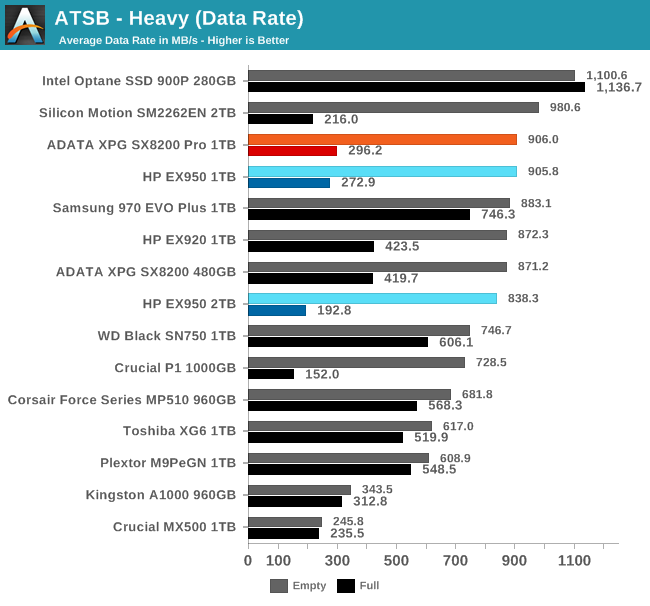
The Silicon Motion NVMe drives provide excellent overall performance when the Heavy test is run on an empty drive, but at the cost of much worse full-drive performance. This effect is not as strong for the 1TB models as for the 2TB HP EX950, which has also regressed overall from the performance of the pre-production firmware. The very slight gains the 1TB SM2262EN drives make over the HP EX920 in empty-drive performance do not come close to justifying the sacrifice in full-drive performance, especially since the SM2262 was already subpar in this respect.
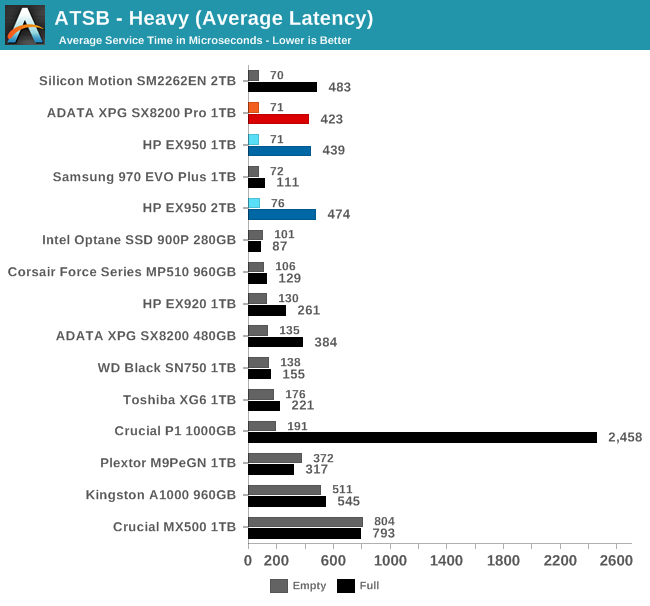
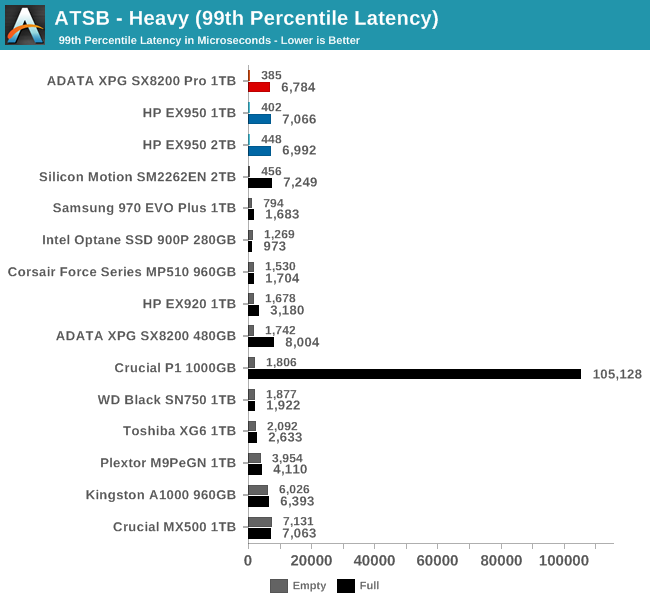
The average and 99th percentile latency scores from the SM2262EN drives are unrivaled when the Heavy test is run on an empty drive, but when the drives are full the average latency scores regress to low-end NVMe levels and the 99th percentile latency scores end up comparable to mainstream SATA drives.
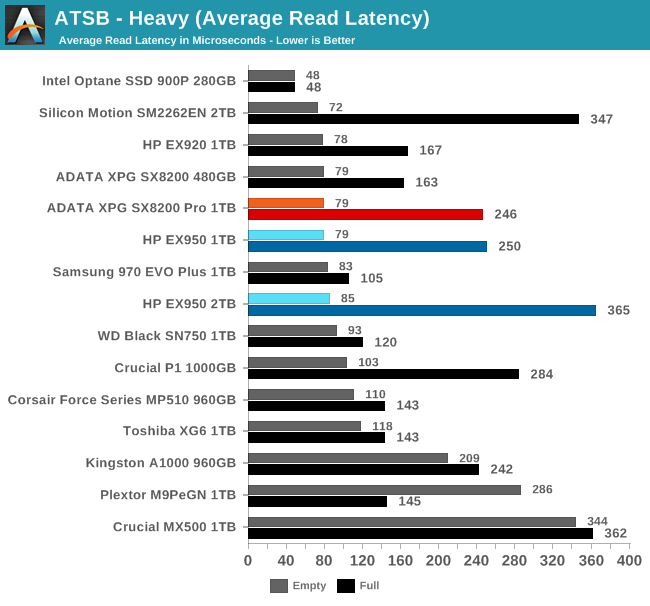
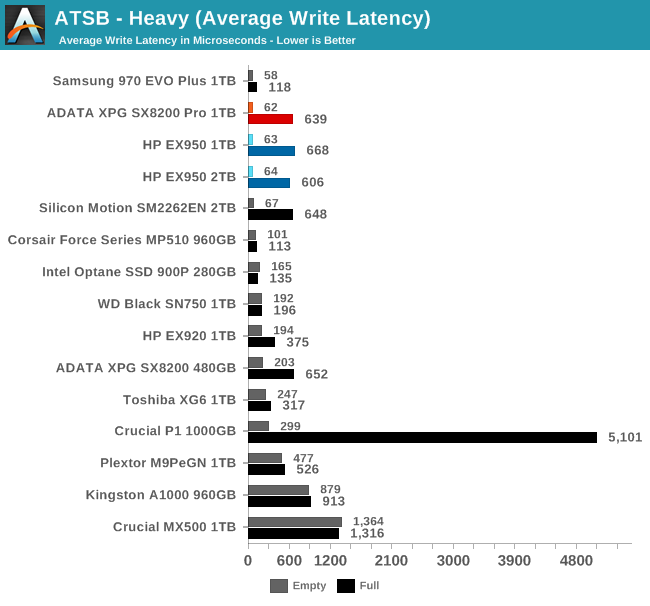
The best-case average read latency scores from the SM2262EN drives when the Heavy test is run on an empty drive are unchanged from the earlier SM2262 drives and remain among the best from any flash-based SSD. The empty-drive average write latencies are significantly faster than the older drives and are comparable to what Samsung's latest 970 EVO Plus provides. But as with the other metrics, performance on a full drive is not competitive with other high-end SSDs.
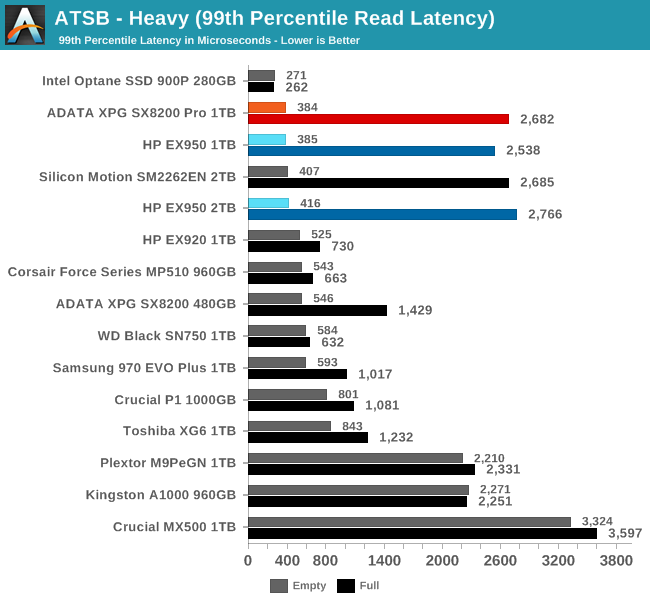
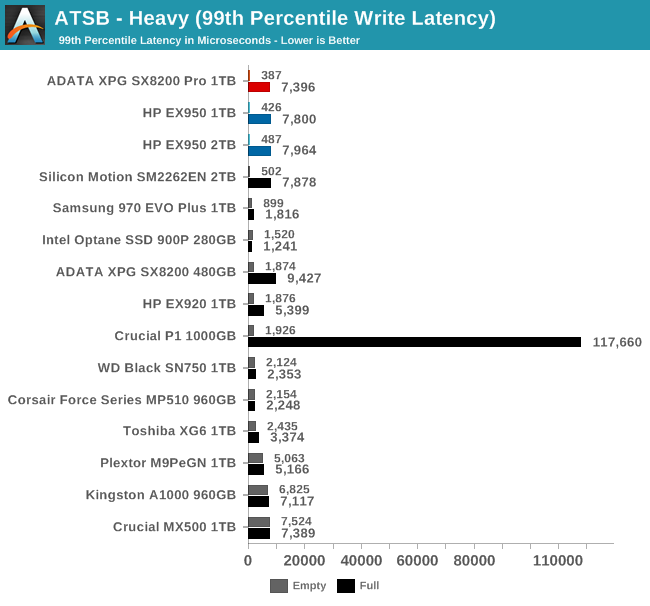
The 99th percentile read and write latency scores repeat the same story as above. Silicon Motion has optimized these drives for extremely good performance when they don't have much data to keep track of and can operate almost entirely from their SLC caches, but at great cost to worst-case behavior.
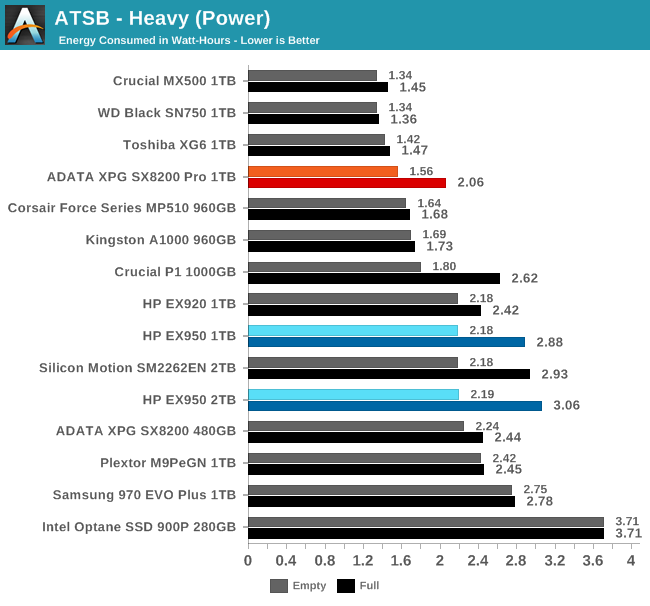
The ADATA SX8200 Pro again turns in much better power consumption scores than the HP EX950 or other SMI-based NVMe drives, but at its best it is still a bit more power-hungry than the WD Black and Toshiba's XG6. Due to the extreme performance drops when operating with a full drive, the SM2262EN drives all require much more energy to complete those test runs. That disparity in full vs empty energy efficiency is only matched by the QLC based drives like the Crucial P1 that also use a Silicon Motion controller and prioritize SLC cache performance.










42 Comments
View All Comments
cassiohui - Thursday, February 7, 2019 - link
Hi Billy, just wondering, why is the 970 pro not in the graphs when even the 900p is?Death666Angel - Thursday, February 7, 2019 - link
They have stated on Twitter and in the comments before that they did not receive a 970 Pro review sample.cassiohui - Thursday, February 7, 2019 - link
960 pro maybe?mapesdhs - Thursday, February 7, 2019 - link
Pity they don't just buy them in themselves to do the tests anyway. I'd put more faith in data thathasn't come from free samples. :)
Billy Tallis - Thursday, February 7, 2019 - link
CPU, GPU and DRAM vendors can in theory sample chips that will overclock better than the average retail item, but there's no easy way for SSD vendors to cheat on performance with careful sampling. And the number of drives that don't survive my testing strongly suggests that they aren't doing any sort of extra QA before sending samples to me.jahid - Thursday, February 7, 2019 - link
Thanks for your valuable writing. HP some model availble in https://www.startech.com.bd/component/SSD-Hard-Dis...ballsystemlord - Thursday, February 7, 2019 - link
Well, I will not be purchasing an EX950. That is for sure. I'm bound to run the SLC down quite a bit and then performance will tank.KAlmquist - Sunday, February 10, 2019 - link
These drives are mostly of interest to people who need odd sized drives. For example, if you need a 600GB drive, you probably have to buy a 1TB drive and only use 600GB of it. Either of the 1TB drives should perform reasonably in this scenario. You might still have to tweak the power saving settings to avoid putting the drive to sleep too frequently (due to the huge wakeup time), but the active idle power is less that one watt.dromoxen - Wednesday, February 20, 2019 - link
For me , anything over 500Gb is going to be used for mass storage, so HDD rulez. But ssd would be better on speed, noise and (possibly) reliability. I dont need ultra speeds, just something cheap enough, and faster than HDD. A long way off, still .Why couldn't ADATA offer two versions of the drive, or at least two firmwares, one for Boy racers, one for commercial use? if you can get a chandelier on your ram sticks ....well?
upvts - Monday, July 29, 2019 - link
How full is full? 100%? And is there a noticeable cliff in the performance, or is there a general decline? Or both (gradual decline in performance until the drives are filled to some threshold amount, after which the performance drops off a cliff)? If we were to leave enough space empty on the drive, could we avoid this hypothetical cliff?